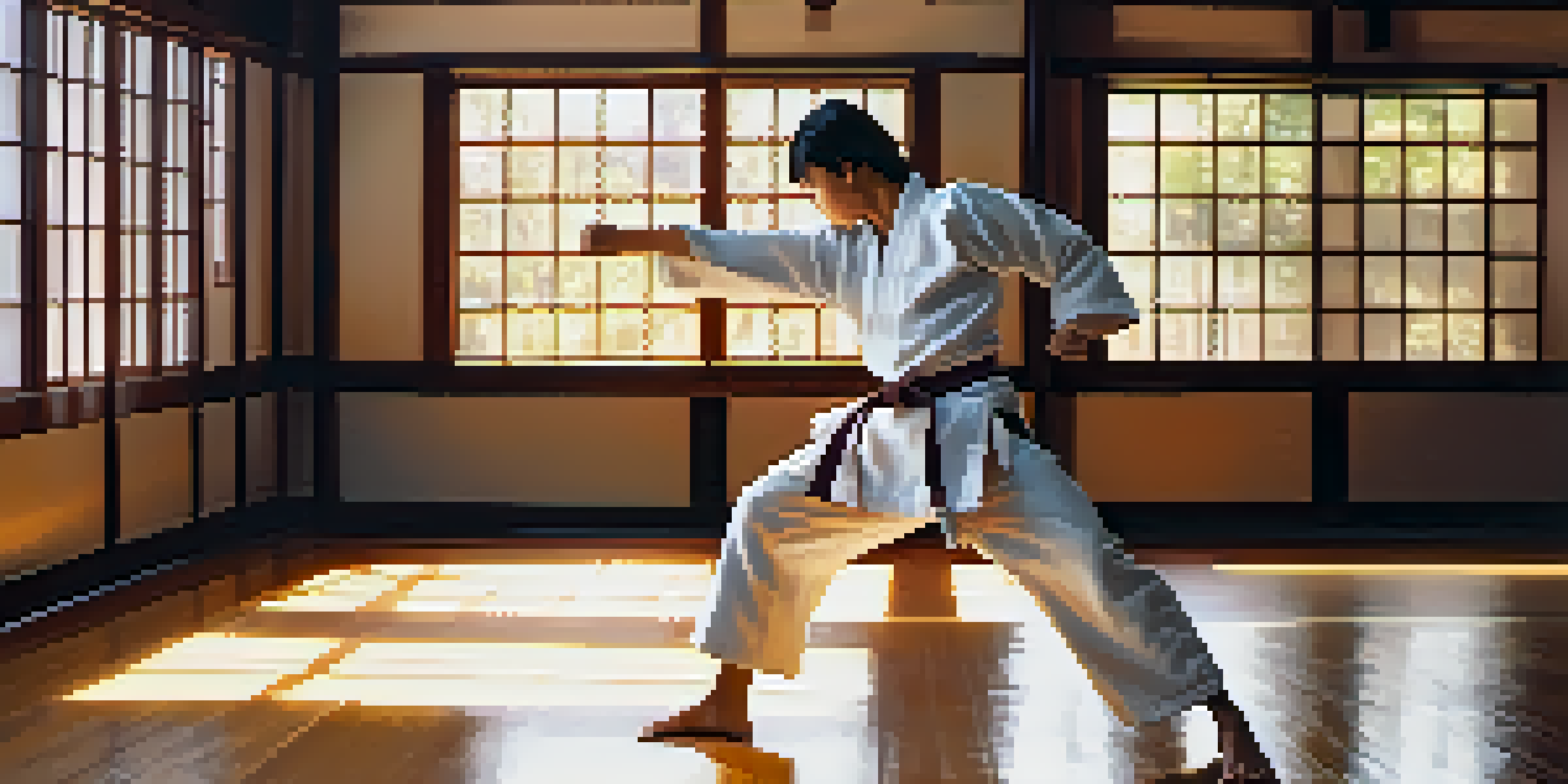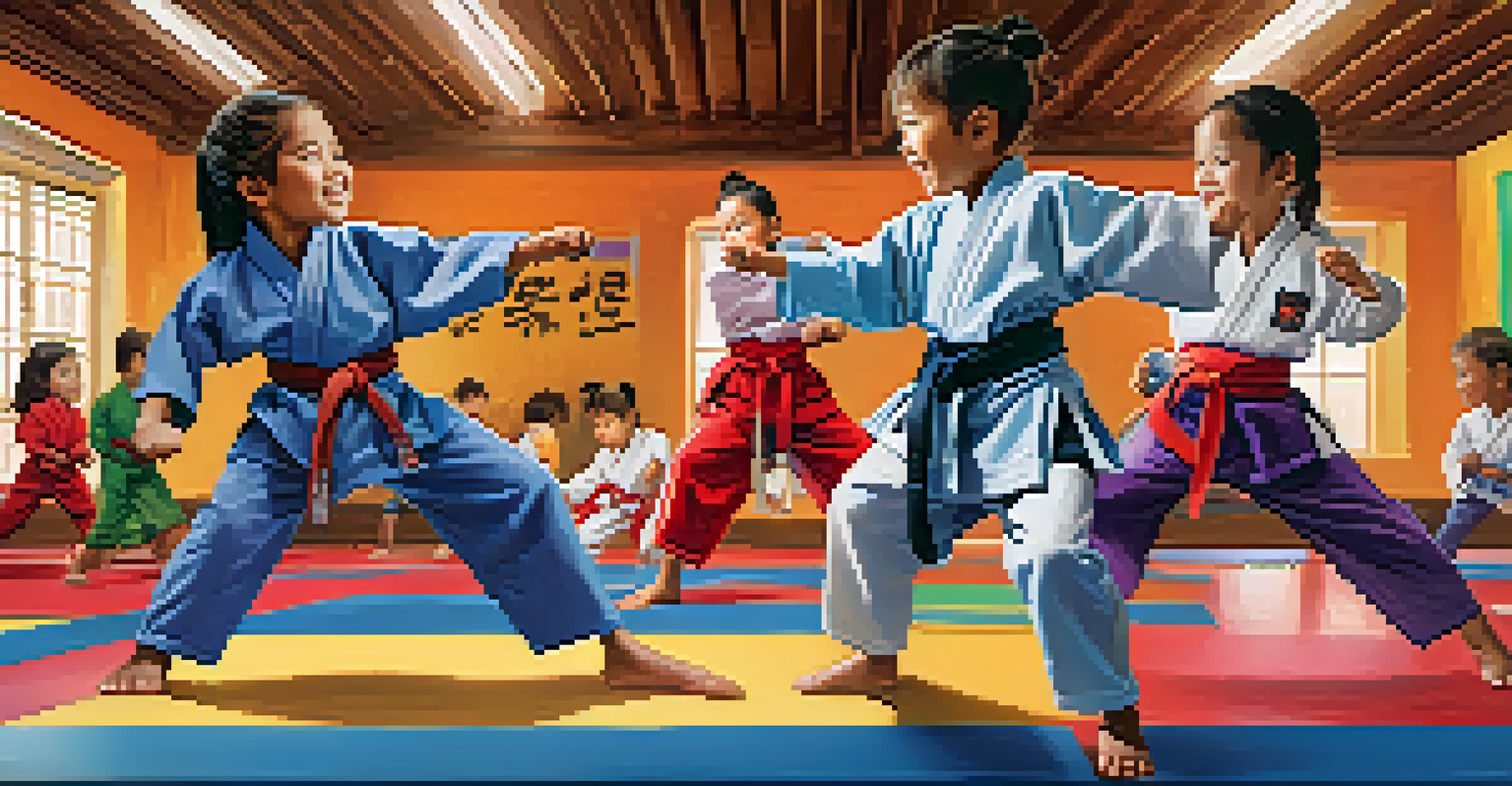How Martial Arts Cultivates Leadership Skills in Young Minds

Understanding Leadership Through Martial Arts
Martial arts is more than just physical training; it's a pathway to developing leadership skills in young practitioners. At its core, martial arts teaches discipline, focus, and respect—qualities that resonate deeply with effective leadership. As students learn techniques and strategies, they also gain insight into how to guide others, making them more confident leaders.
The ultimate aim of martial arts is not having to use them.
Engaging in martial arts provides a structured environment where youth can understand the value of authority and responsibility. They learn to take charge not just in the dojo, but in their daily lives. This foundational understanding of leadership helps them navigate challenges both on and off the mat.
By embracing leadership roles in classes, such as leading warm-ups or assisting newer students, young practitioners experience firsthand the dynamics of guiding a team. This practical experience is invaluable, as it fosters leadership skills that extend beyond martial arts into various aspects of life.
Building Confidence and Self-Esteem
One of the most significant impacts of martial arts is the boost in confidence and self-esteem it provides to young minds. As students progress through the ranks and earn new belts, they experience a sense of accomplishment that reinforces their belief in themselves. This newfound confidence is crucial for any aspiring leader.

With each challenge faced in martial arts—from mastering a new technique to sparring with a partner—students learn to overcome obstacles. This resilience is a key quality of effective leaders, who must navigate difficult situations with poise. The ability to face fears and push through limits fosters a mindset that is essential for leadership.
Martial Arts Builds Leadership Skills
Through discipline, focus, and practical experiences, martial arts equips young practitioners with essential leadership qualities.
Moreover, martial arts encourages young people to embrace their individuality. It teaches them that it's okay to be themselves, which is vital for authentic leadership. When young leaders feel secure in their identities, they can inspire and motivate others more effectively.
Developing Communication Skills
Communication is a cornerstone of effective leadership, and martial arts provides a unique platform for honing these skills. In classes, students are encouraged to give and receive feedback, which fosters an environment of open dialogue. This practice is essential for developing the ability to articulate thoughts clearly and listen actively.
Leadership is not about being in charge. It is about taking care of those in your charge.
Additionally, martial arts often involves partner drills and group activities where clear communication is vital for success. As students learn to express their ideas and intentions to their peers, they become more adept at conveying messages in a way that resonates with others. This skill translates directly to leadership roles, where conveying vision and direction is paramount.
Through the practice of verbal and non-verbal communication in martial arts, young leaders learn to adapt their styles to different audiences. Whether they're addressing a group or having one-on-one conversations, these communication skills will serve them well in their future endeavors.
Fostering Teamwork and Collaboration
Martial arts is often seen as an individual pursuit, but it also emphasizes the importance of teamwork and collaboration. Many martial arts schools incorporate group exercises and partner work, teaching students how to rely on and support each other. This collaborative spirit is essential for effective leadership.
In martial arts, practitioners quickly learn that success often hinges on the ability to work cohesively with others. As they train together, they develop trust and camaraderie, which are key elements of any successful team. Leaders who can foster a sense of community are better equipped to motivate and unify their teams.
Confidence Grows Through Achievement
As students progress in martial arts, they gain confidence and resilience, which are vital traits for aspiring leaders.
Moreover, martial arts teaches conflict resolution skills through sparring and controlled challenges. Students learn how to navigate disagreements and find common ground, preparing them for leadership situations where collaboration and compromise are necessary.
Instilling Discipline and Focus
Discipline is a fundamental principle in martial arts, impacting how students approach training and life. The rigorous practice schedules and the commitment required to progress through belts instill a sense of discipline that is crucial for leadership. Leaders must be able to set goals and adhere to them, a skill that martial arts helps to cultivate.
In addition to discipline, martial arts enhances focus. Students learn to concentrate on their techniques and strategies, filtering out distractions. This heightened focus translates into the ability to lead effectively, as leaders must remain attentive to their goals and the needs of their team.
As young practitioners develop these traits, they also learn the importance of consistency and perseverance. The discipline to keep pushing forward, even when faced with setbacks, is a hallmark of great leaders who inspire others through their unwavering commitment.
Encouraging Ethical Decision-Making
Martial arts often emphasizes a strong ethical code, teaching young practitioners the importance of integrity and responsibility. Ethical decision-making is crucial for any leader, and martial arts provides a framework for understanding right from wrong. Students learn to think critically and make choices that align with their values.
In martial arts training, students are frequently faced with scenarios that test their morals and principles. Whether it's the way they treat their peers or how they handle competition, these experiences shape their understanding of ethical leadership. This foundation prepares them to make sound decisions in the real world.
Teamwork is Essential in Training
Martial arts emphasizes collaboration and conflict resolution, preparing students to lead effectively within a team.
Moreover, martial arts encourages empathy and respect for others, which are essential qualities for ethical leaders. By understanding the impact of their actions on others, young practitioners are better equipped to lead with compassion and integrity.
Creating Resilient Problem-Solvers
Martial arts training is inherently about overcoming challenges, which helps to develop resilient problem-solvers. Every time a student faces a tough opponent or struggles with a difficult technique, they learn to assess the situation and find solutions. This problem-solving mindset is invaluable for effective leadership.
In martial arts, setbacks are seen as opportunities for growth rather than failures. Students learn to analyze what went wrong and adjust their strategies accordingly. This resilience is a key trait for leaders, who often encounter obstacles that require creative solutions.

Through continuous practice and reflection, martial arts cultivates a proactive approach to challenges. Young leaders trained in this way are more likely to tackle problems head-on and inspire their teams to do the same.